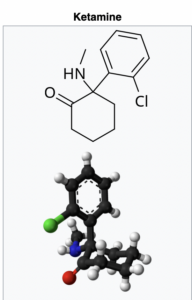What does the Governor of Maine & Matthew Perry have in common? A drug called Ketamine.

The death of Matthew Perry, due to the acute effect of Ketamine, has brought international attention to the use of the drug within the psychiatric industry. Ketamine, primarily known as an anesthetic, has shown potential in ameliorating depressive symptoms and suicidal ideation according to Missouri Medicine: The Journal of the Missouri State Medical Association, but wait, according to the Food and Drug Administration (FDA) there clearly is a serious down side.
There is abundant evidence that psychiatric drugs cause violence; 22 international drug regulatory warnings cite psychiatric drugs causing violent reactions, including mania, hostility, violence, aggression, and homicidal ideation. Between 2004 and 2012, there were 14,773 reports to the U.S. FDA’s MedWatch system on psychiatric drugs causing violent side effects including: 1,531 cases of homicidal ideation/homicide, 3,287 cases of mania & 8,219 cases of aggression. Note that the FDA estimates that less than 1% of all serious events are ever reported, so the actual number of adverse side effects occurring is most certainly higher.

According to the Mental Health Watch Dog, the Citizens Commission on Human Rights, CCHR, “In April 2023, The Guardian reported hundreds of unregulated Ketamine infusion clinics operating in the U.S. without any oversight. Ketamine can also be obtained through telemedicine where it is dished out like “candy.”According to the psychedelic investment fund PsyMed, there were around 20 Ketamine clinics in 2019. By the end of 2022, there were reportedly over 600 independent Ketamine clinics. One company charges $1,158 for six sessions. Profits from Ketamine grew from $8.3 million in 2017 to $185 million in 2022, according to The Wall Street Journal. Moreover, Marketwatch estimates the global Ketamine market will grow from $132 million in 2021 to $3.8 billion by 2027.”

In the aftermath of the tragic mass killing in the State of Maine, Governor Mills’, under executive order, appointed an investigative “panel” to determine the events leading to the shooting incident by Robert Card, a psychiatric patient. It is beyond belief that the Governor would appoint a psychiatrist whose specialty is treating psychiatric patients with the drug Ketamine.
Ironically, the FDA has not approved Ketamine for treatment for any psychiatric disorder nor has it determined that Ketamine is either safe or effective for psychiatric uses. Obviously, given that the Governor of Maine has chosen a doctor who is using an unapproved drug as “treatment,” one has to seriously question if this is a sound choice. AbleChild is requesting that this doctor be removed from this panel and the Governor provide a detailed explanation of how this doctor made it thru the expected careful selection process.
The tragic death of Matthew Perry and the appointment of a Ketamine-prescribing psychiatrist in Maine are interconnected in the broader context of mental health treatment and substance use. The use of Ketamine in psychiatric settings has not been approved by the FDA and one can only wonder what the Governor thought this psychiatrist would bring to the conversation. This kind of decision-making does not bode well for the outcome of the investigation.

